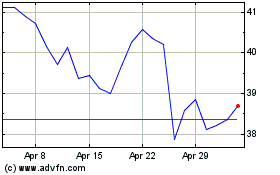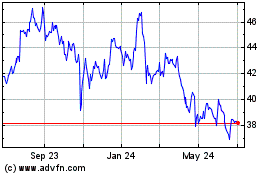Thanks to Michael Phelps, Katie Ledecky and Simone Biles, the
U.S. is on pace to take home the most gold medals at the 2016
Summer Olympics. When it comes to television ratings, however, NBC
may have to settle for a bronze.
Although the Rio Games are dominating everything else on
television, the performance is significantly below the 2012 Summer
Games held in London, according to Nielsen. Through Saturday,
Comcast Corp.'s NBC is averaging 27.9 million for the first nine
nights, down about 15.5% from the London Olympics, which finished
with an average of 33 million viewers. The Games are also off from
the 34.2 million viewers the 2008 Summer Olympics in Beijing
averaged.
So far, NBC isn't delivering the audience it promised
advertisers who spent more than $1.2 billion for commercials during
the 17-day event. Of particular concern is a roughly 30% drop among
viewers age 18-34, a demographic advertisers pay a premium to
reach.
The lower-than-expected ratings show that even an institution as
big as the Olympics isn't immune to changing media consumption
habits and the abundance of choice viewers have on television and
online.
"It's not that we're watching less, it's that we're watching
more than three channels," said Victor Matheson, a professor who
specializes in sports economics at the College of the Holy
Cross.
NBC has said it is unreasonable to expect ratings as high as
London with such swift changes to viewing habits. But it is taking
advantage of the plethora of platforms by putting Olympic events on
its cable networks as well as streaming every competition live.
Through Thursday, NBC's Olympics live streaming reached 1.28
billion minutes, passing the combined total of the London and Sochi
Games.
Combined, the streaming and cable coverage is adding about 2
million viewers a night—still not enough to overtake London.
Heading into the Olympics, headlines focused largely on Brazil's
struggle to prepare, with Zika virus concerns, political turmoil
and pollution. NBC's ability to promote the Games may have been
even more hindered by the bitter U.S. race for president between
Donald Trump and Hillary Clinton.
"There were more distractions than usual," said NBC Sports Group
Chairman Mark Lazarus. "The country is so hideously divided I think
it took people a little bit of time to get together and rally
behind the athletes."
While the first few days were down sharply from London including
a 35% drop for the opening ceremony, the gap has tightened as
compelling story lines emerged. Mr. Phelps collected his 23rd gold
medal in what may be his last Olympics, the U.S. gymnastics team
dominated and Ms. Ledecky swept events in the pool.
Despite the ratings decline from four years ago, NBC executives
and advertisers aren't upset.
"This will be our most economically successful Games in
history," said Mr. Lazarus. "We are extremely pleased with where we
are going to end up." Since the Games began, NBC has raked in an
additional $30 million in ad sales, he said.
NBC has enough inventory remaining in the Games to fulfill any
ratings shortfalls, he added.
Last month, NBCUniversal Chief Executive Steve Burke told
analysts the Rio Olympics will "make a lot more" than the
approximately $120 million profit from London.
The rights to the Rio Olympics were part of a $4.38 billion deal
NBCU struck in 2011 for the 2014 Games through 2020. NBC followed
that deal up in 2014 with a $7.65 billion pact to lock up the rest
of the Games through 2032.
Those large gambles don't intimidate Mr. Lazarus, even with all
the uncertainty surrounding traditional media. He notes that NBCU
has rights for all platforms and is free to experiment and create
new revenue streams that will allow the event to remain
profitable.
"Consumption patterns are changing but a company like ours is
part of facilitating that change," Mr. Lazarus said. "The set of
rights that we hold allows us to be part of whatever is happening
today and what's ahead."
Hypothetically, he said, that could even include selling the
Games directly to consumers.
Lee Berke, a sports media consultant, said NBCU made a good bet
despite the traditional ratings dip this year. NBCU is ahead of the
game by embracing streaming and putting more events on more
channels.
"You could see them have dedicated channels going forward for
every Olympic sport," he said. "There are going to be more dollars
down the road."
Ad buyers point out that any ratings shortfall won't damp future
interest in the Olympics because the audience is still a rarity in
the TV business.
"If you look at the numbers and compare them to the ratings for
an average program, the Olympics are far superior," said Rino
Scanzoni, chief investment officer of WPP PLC's GroupM, the world's
largest ad-buying firm.
Indeed, NBC's rivals are ready to concede more than just a
participation trophy.
"Relative to all other television, the Olympics are stronger
than ever," said David Poltrack, chief research officer for CBS
Corp.
Write to Joe Flint at joe.flint@wsj.com and Suzanne Vranica at
suzanne.vranica@wsj.com
(END) Dow Jones Newswires
August 14, 2016 21:45 ET (01:45 GMT)
Copyright (c) 2016 Dow Jones & Company, Inc.
Comcast (NASDAQ:CMCSA)
Historical Stock Chart
From Mar 2024 to Apr 2024

Comcast (NASDAQ:CMCSA)
Historical Stock Chart
From Apr 2023 to Apr 2024
